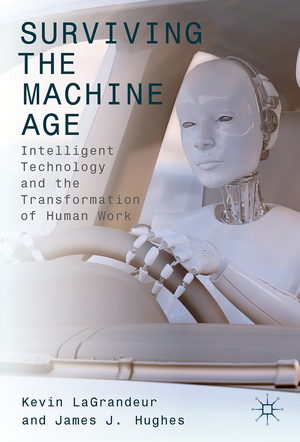Surviving the Machine Age: Intelligent Technology and the Transformation of Human Work
Editat de Kevin LaGrandeur, James J. Hughesen Limba Engleză Hardback – 23 mar 2017
This book examines the current state of the technologically-caused unemployed, and attempts to answer the question of how to proceed into an era beyond technological unemployment. Beginning with an overview of the most salient issues, the experts collected in this work present their own novel visions of the future and offer suggestions for adapting to a more symbiotic economic relationship with AI. These suggestions include different modes of dealing with education, aging workers, government policies, and the machines themselves. Ultimately, they lay out a whole new approach to economics, one in which we learn to merge with and adapt to our increasingly intelligent creations.
Toate formatele și edițiile
| Toate formatele și edițiile | Preț | Express |
|---|---|---|
| Paperback (1) | 576.89 lei 6-8 săpt. | |
| Springer International Publishing – 4 mai 2018 | 576.89 lei 6-8 săpt. | |
| Hardback (1) | 582.12 lei 6-8 săpt. | |
| Springer International Publishing – 23 mar 2017 | 582.12 lei 6-8 săpt. |
Preț: 582.12 lei
Preț vechi: 684.84 lei
-15% Nou
Puncte Express: 873
Preț estimativ în valută:
111.39€ • 116.07$ • 92.23£
111.39€ • 116.07$ • 92.23£
Carte tipărită la comandă
Livrare economică 04-18 aprilie
Preluare comenzi: 021 569.72.76
Specificații
ISBN-13: 9783319511641
ISBN-10: 3319511645
Pagini: 180
Ilustrații: XIII, 166 p.
Dimensiuni: 148 x 210 x 16 mm
Greutate: 0.37 kg
Ediția:1st ed. 2017
Editura: Springer International Publishing
Colecția Palgrave Macmillan
Locul publicării:Cham, Switzerland
ISBN-10: 3319511645
Pagini: 180
Ilustrații: XIII, 166 p.
Dimensiuni: 148 x 210 x 16 mm
Greutate: 0.37 kg
Ediția:1st ed. 2017
Editura: Springer International Publishing
Colecția Palgrave Macmillan
Locul publicării:Cham, Switzerland
Cuprins
1. Introduction: An Overview of Emerging Technology and Employment in the Early Twenty-First Century.-2. Is Technological Unemployment Real? An Assessment and a Plea for Abundance Economics.-3. Creative Destruction: Emerging Technology and the Changing Course of Job Creation.-4. Employment In The Age of Em: Simulated Brains and the Economics of Labor.-5. Building a Postwork Utopia: Technological Unemployment, Life Extension and the Future of Human Flourishing.-6. Can We Build a Resilient Employment Market for an Uncertain Future?.-7. Unconditional Basic Income as a Solution to Technological Unemployment.-8.Policy Solutions to Technological Unemployment.-9. What is the Job Creation Potential of New Technologies?.-10. Rage Against the Machine: Rethinking Education in the Face of Technological Unemployment.
Notă biografică
Kevin LaGrandeur is Professor at the New York Institute of Technology (NYIT), USA and a Fellow of the Institute for Ethics and Emerging Technology. He is an expert in technology and culture and also has a degree in economics. His book Artificial Slaves won the 2014 Science Fiction and Technoculture Studies Prize.
James J. Hughes is Executive Director of the Institute for Ethics and Emerging Technologies (IEET) and a sociologist. He authored Citizen Cyborg: Why Democratic Societies Must Respond to the Redesigned Human of the Future. He is also the editor of the 2014 special issue of the Journal of Evolution and Technology on technological unemployment.
James J. Hughes is Executive Director of the Institute for Ethics and Emerging Technologies (IEET) and a sociologist. He authored Citizen Cyborg: Why Democratic Societies Must Respond to the Redesigned Human of the Future. He is also the editor of the 2014 special issue of the Journal of Evolution and Technology on technological unemployment.
Textul de pe ultima copertă
This book examines the current state of the technologically-caused unemployed, and attempts to answer the question of how to proceed into an era beyond technological unemployment. Beginning with an overview of the most salient issues, the experts collected in this work present their own novel visions of the future and offer suggestions for adapting to a more symbiotic economic relationship with AI. These suggestions include different modes of dealing with education, aging workers, government policies, and the machines themselves. Ultimately, they lay out a whole new approach to economics, one in which we learn to merge with and adapt to our increasingly intelligent creations.
Caracteristici
Appeals to readers interested in what effects emerging technology might have on the future of employment—both positive and negative Addresses key question of whether emerging technologies will make employment over the next couple of decades fundamentally different than the previous two centuries Brings together leading academics in the fields of science and technology studies, philosophy, ethics, economics and business administration
















